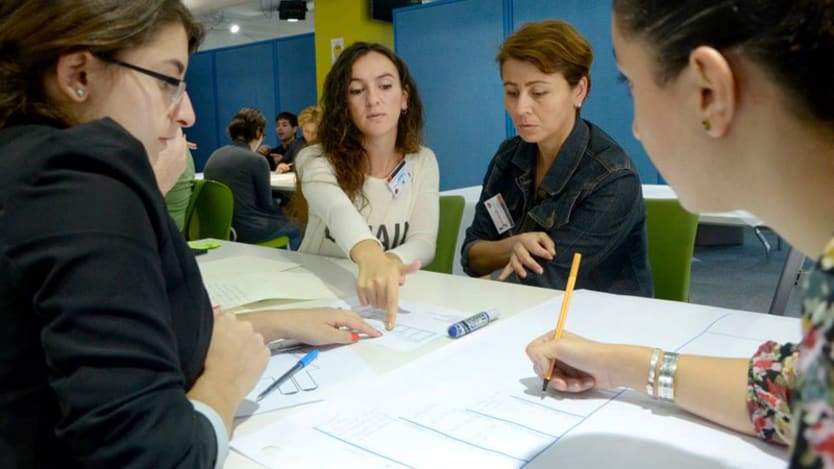
Can innovation help achieve the new global development agenda? Can it help address growing humanitarian needs worldwide? The stakes are high: Last year, U.N. member states endorsed the ambitious Sustainable Development Goals, and in May 2016, the World Humanitarian Summit sets out to reshape aid.
Innovation in the development agenda includes new processes, new technologies, or new ways of using existing technology. No matter what the innovation, it must add value for the end user. A new technology or process that does not create a positive change in the lives of the people we work for does not qualify as innovation.
U.N. Development Program and many other U.N. agencies have invested in experiments for years. Our Year in Review 2015 is just out and offers examples and lessons. Based on our experience, here are six ways to leverage innovation for Agenda 2030.
1. Invite external expertise.
Open Innovation Challenges have enjoyed a renaissance in the development and humanitarian sector because they harvest new ideas and talent. An OIC is a structured process to find new solutions by identifying a development problem; creating and publicizing an OIC with prizes for solving that problem; getting the most capable participants to compete; and rewarding the winner.
UNDP tested this method for the first time in 2013 to find renewable and financially sustainable energy solutions for off-the-grid communities in Bosnia. Since that first successful trial, other UNDP offices have tested OICs. Based on our lessons, UNDP endorsed a new policy this year enabling all our offices to run OICs and support government partners to do the same. Our experiments so far show that OICs help UNDP, governments and other partners attract talent to solve the toughest development problems. They also stimulate markets and manage risk by opening up the competition process for the best solution.
2. Focus on the change, not the solution.
Read stories on innovation:
► Meet the Wearables for Good winners
► 5 popular NGO mobile apps — and how to use them
► How to achieve flood resilience? Embrace innovation
► Global Innovation Fund's first investments shed light on mission
Too many innovation initiatives encourage innovation — often technological innovation — for its own sake, and do not evaluate their impact. Without evidence of impact, support for innovation will dramatically decrease. That’s why more and more innovation groups are exploring evaluation measures. An encouraging example is USAID’s initiative to assess the impact of programs that are designed in a nonlinear way.
Currently, international organizations develop theories of change to guide their work. But too many theories of change are not leveraged to revisit progress and iterate if necessary; they often become “logframes on steroids.”
Emerging finance mechanisms can change the focus toward the desired outcome, rather than the current emphasis on laying out detailed activities in a multi-year plan. Pay-for-success models, social impact bonds and other forms of impact investing bring together governments, service providers and businesses to fund social programs and even offer higher returns if social outcomes are met or surpassed.
Based on promising experiments in the field, putting the desired outcome front and center opens the door for true iteration in program and policy design.
3. Forget creativity: Formulate and test hypotheses.
Reframing innovation from a process of creativity and idea-generation to a method of formulating and testing assumptions helps partners design better innovation trials. In Papua New Guinea, we tested whether a low-cost tool can help the government address corruption and mismanagement, which now gobbles up some 40 percent of the country’s annual budget. In 2014, we partnered with the Australian government and telecoms MobiMedia and Digicel to design a simple SMS-system.
We tested this “minimum viable product” with the 1,200 staff in the Department of Finance, and updated it based on user-feedback. Within four months, it led to over 250 cases of alleged corruption under investigation. Based on the uptake of the first version, the service was rolled out to six new departments and 25,000 government officials countrywide in 2015.
4. Fewer pilots, more scale.
Scaling has different connotations. Scaling up an initiative aims to reach more people, and scaling out an initiative aims to transfer a successful model to another context. Both cases require the capacity to adapt and thinking about scale in the initial design. Over the past two years, the UNDP Innovation Facility gave seed funding to over 100 initiatives, and all of them had to compete for funds and develop a scaling pathway. We are now working on organizational guidelines for scaling with the Brookings Institution. An initial assessment of the 2015 portfolio shows an uptake of more than 60 percent of our initiatives by either the government or private-sector partners.
5. Embrace politics.
“Despite innovation efforts and optimism across the development sector, few innovations lead to actual sustainable, systemic change,” as the Overseas Development Institute noted in a recent research paper, “Innovating for pro-poor services: why politics matter.” Barriers for bringing innovations to scale are often political in nature, and navigating politics in innovation and public-sector reform must be done out in the open.
In April 2016, UNDP convened a conference to discuss with partners about how best to work with political settlements, ”the expression of a common understanding, usually forged between elites, about how power is organized and exercised.” If innovation is to serve the most marginalized, it has to be based on an analysis of political economy.
6. Make systems-thinking practical.
The Agenda 2030 is based on systems-thinking and emphasizes that the development goals are indivisible. A major challenge for governments today is to ensure that goals are not addressed in isolation and effects are not measured against single indicators.
The field of impact investing is a good example of the shift to a systems perspective. While the first generation of impact funds pursued outputs — such as the number of social enterprises funded — the second generation of impact funds is more oriented toward outcomes. For example, how many people have been employed for 24 consecutive months who were previously unemployed. The third generation of financial instruments targets both social and economic returns and works at the systems level to raise the quality of life of whole groups of people.
We believe that practical experiments are the best way to find new solutions to old problems. Karl Popper said: “Good tests kill flawed theories; we remain alive to guess again.”
We are very much alive. Alive, driven to tackle tough development challenges and learn along the way. We hope to see you on that path.
To read additional content on innovation, go to Focus On: Innovation in partnership with Philips.
Update, April 19, 2016: This article was updated to state that UNDP tested OIC for the first time in 2013 to find renewable and financially sustainable energy solutions for off-the-grid communities in Bosnia, and to explain UNDP’s organizational guidelines for scaling.








